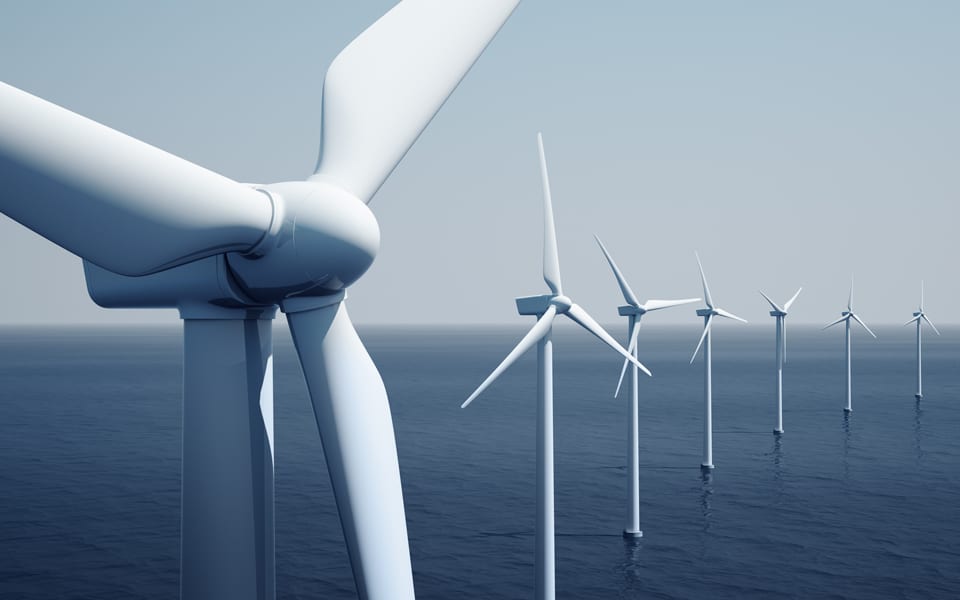Significant investment by the UK government and ambitious targets could create major opportunities for Irish businesses entering the UK offshore wind sector. Playing to your strengths is key to success, say industry experts.
Irish companies are in an ideal position to support and collaborate with the UK offshore wind industry, which recently received a big boost through a commitment made by the UK government to significantly expand its offshore wind industry. The ability to compete in what is now a global marketplace is vital to its success. This was the general opinion held by the industry leaders who took part in Enterprise Ireland’s Offshore Wind Forum and UK Industry Visit, which took place in Dublin in March 2019.
The event took place just a few weeks after the UK government announced ambitious plans to generate a total of 30 Gigawatts (GW) of offshore wind power by 2030 – a huge jump from the current operational capacity of 7GW. To fulfill such an ambitious target, over £40 (€45) billion will be invested in infrastructure. It’s also worth noting that the UK government has made a strong commitment to the investment regardless of the outcome of Brexit.
While a significant objective of the plan is to create jobs and regenerate rural coastal communities, therefore requiring local content (the plan aims for 60% local content), the offshore wind industry is a global marketplace, and the UK must engage globally in order to achieve such ambitious targets in a timely and cost-effective manner.
Competitive market
The race to find cheaper and more sustainable natural forms of energy is a global one, and not surprisingly, the offshore wind industry is a very competitive marketplace – and that competition is showing no signs of slowing down. Irish companies can find themselves competing with an established European supply chain, along with global entrants emerging from Asia, the Middle East and North America. So how can Irish companies stand out?
Alan Duncan of Scotia Supply Chain, and a speaker at the Enterprise Ireland Offshore Wind Forum, commented: “There’s no point in Irish companies being a ‘me too’. They must work out what they’re good at and play to those strengths.”
This was a general theme at the forum – but as showcased by Duncan and other speakers, Ireland has impressive strengths in several areas, and has an excellent reputation for innovation across key sectors. Thanks to our extensive marine heritage and history, Irish companies tend to be particularly strong and innovative in the areas of marine consultancy, offshore survey provision, technical authority and geotechnical services. With wind farms now being built further offshore and environmental challenges becoming ever more challenging, these services are becoming more and more vital. With the growth of floating offshore wind, the demand will be even greater.
Irish companies also possess strengths in the areas of high voltage engineering and civil engineering. Within the area of installation, which includes vessel design, ancillary engineering, component handling, port services and marine coordination credentials, Irish companies are considered extremely innovative and capable.
Meeting challenges
Building wind farms further offshore brings challenges beyond construction. Maintenance and repair work is time and capital intensive and the ‘race to zero’ (in terms of human interaction with turbines) is well and truly on. Finding innovative ways to reduce repairs and ensure wind farms are operating optimally is an area of real growth, with industry actively looking for the tools and services to expand the life cycle of assets.
Remote monitoring and data analytics are areas of strength for Irish companies, owing in large part to Ireland’s strong historical capability in the IT and IoT sector as well as our focus on technical innovation. Finding ways to gather data and remotely monitor assets is highly sought after and an area of the offshore wind industry that the Irish supply chain is poised for and ready to excel in.
However, when asset inspection and repair work is required, Irish companies can also deliver, with subsea cable repair and topside inspection and repair strengths.
Importantly, the UK industry has recognised the capability of Irish companies in these and other areas and is keen to work with them in order to find solutions to the challenges that lie ahead. This was evidenced by the number of offshore wind developers and top tier contracting companies that attended the forum, including SSE, Jan De Nul, EDF Renewables, and EDP Renewables. The key, says Duncan, is for Irish companies to work out where they fit within the supply chain and play to their strengths.
There is also power in numbers. Enterprise Ireland has launched an offshore wind cluster, which includes approximately 35 Irish SMEs that are in a prime position to meet the challenges posed by the expansion of the UK offshore wind industry. With over 80 companies earmarked by Enterprise Ireland for involvement, this cluster is sure to grow both in number and capability. The cluster also facilitates internal knowledge sharing and partnerships to place Ireland in an even stronger position to support the UK’s ambitious wind power plans.
For further information on Enterprise Ireland’s offshore wind cluster plans, please contact Darragh Cotter at: darragh.cotter@enterprise-ireland.com



